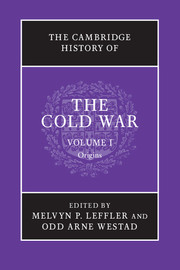Book contents
- Frontmatter
- 1 The Cold War and the international history of the twentieth century
- 2 Ideology and the origins of the Cold War, 1917–1962
- 3 The world economy and the Cold War in the middle of the twentieth century
- 4 The emergence of an American grand strategy, 1945–1952
- 5 The Soviet Union and the world, 1944–1953
- 6 Britain and the Cold War, 1945–1955
- 7 The division of Germany, 1945–1949
- 8 The Marshall Plan and the creation of the West
- 9 The Sovietization of Eastern Europe, 1944–1953
- 10 The Cold War in the Balkans, 1945–1956
- 11 The birth of the People’s Republic of China and the road to the Korean War
- 12 Japan, the United States, and the Cold War, 1945–1960
- 13 The Korean War
- 14 US national security policy from Eisenhower to Kennedy
- 15 Soviet foreign policy, 1953–1962
- 16 East Central Europe, 1953–1956
- 17 The Sino-Soviet alliance and the Cold War in Asia, 1954–1962
- 18 Nuclear weapons and the escalation of the Cold War, 1945–1962
- 19 Culture and the Cold War in Europe
- 20 Cold War mobilization and domestic politics: the United States
- 21 Cold War mobilisation and domestic politics: the Soviet Union
- 22 Decolonization, the global South, and the Cold War, 1919–1962
- 23 Oil, resources, and the Cold War, 1945–1962
- Bibliographical essay
- Index
- References
21 - Cold War mobilisation and domestic politics: the Soviet Union
Published online by Cambridge University Press: 28 September 2010
- Frontmatter
- 1 The Cold War and the international history of the twentieth century
- 2 Ideology and the origins of the Cold War, 1917–1962
- 3 The world economy and the Cold War in the middle of the twentieth century
- 4 The emergence of an American grand strategy, 1945–1952
- 5 The Soviet Union and the world, 1944–1953
- 6 Britain and the Cold War, 1945–1955
- 7 The division of Germany, 1945–1949
- 8 The Marshall Plan and the creation of the West
- 9 The Sovietization of Eastern Europe, 1944–1953
- 10 The Cold War in the Balkans, 1945–1956
- 11 The birth of the People’s Republic of China and the road to the Korean War
- 12 Japan, the United States, and the Cold War, 1945–1960
- 13 The Korean War
- 14 US national security policy from Eisenhower to Kennedy
- 15 Soviet foreign policy, 1953–1962
- 16 East Central Europe, 1953–1956
- 17 The Sino-Soviet alliance and the Cold War in Asia, 1954–1962
- 18 Nuclear weapons and the escalation of the Cold War, 1945–1962
- 19 Culture and the Cold War in Europe
- 20 Cold War mobilization and domestic politics: the United States
- 21 Cold War mobilisation and domestic politics: the Soviet Union
- 22 Decolonization, the global South, and the Cold War, 1919–1962
- 23 Oil, resources, and the Cold War, 1945–1962
- Bibliographical essay
- Index
- References
Summary
In May 1946, Iosif Stalin complained to writers about their excessive respect for Western culture: ‘They [Soviet intellectuals] still feel themselves minors, not one hundred percent, they’ve got used to considering themselves in a situation of eternal pupils…[a good Soviet man] adores some foreign bastard, a scholar who is three heads shorter than he. He loses his dignity.’ And, thirteen years later, Nikita Khrushchev revealed a similar anxiety about the dignity of the USSR on the eve of his trip to the United States. As he later reminisced: ‘I’ll admit that I was worried … we had to express our point of view…without letting ourselves be humiliated … Stalin [had] kept trying to convince us that we…were no good, that we wouldn’t be able to stand up to the imperialists … Stalin’s words sounded in my head.’
As both of these statements indicate, the Soviet leadership throughout the early Cold War was obsessed with the competition with the West, and was deeply anxious about its status and the need to improve its weak position. The enormous expenditures by the Soviet state on the military and military industrial establishments, at the direct expense of consumption, also ensured that the Cold War had an enormous impact on the lives of ordinary Soviet citizens. Yet, it has not been common for historians to discuss the internal political and social developments within the USSR specifically through the prism of the Cold War, or even to emphasise the role of the Cold War in analysing Soviet domestic political and social developments during the period (though there are of course exceptions). This is in sharp contrast to historians of the United States, who are engaged in a sophisticated debate on whether it is reasonable to define the postwar era as one dominated by the Cold War.
- Type
- Chapter
- Information
- The Cambridge History of the Cold War , pp. 442 - 463Publisher: Cambridge University PressPrint publication year: 2010



